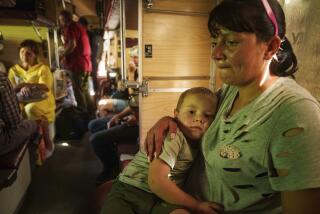2 Killed at Tense Soviet Border With Lithuania : Unrest: A Byelorussian officer and a border captain die. Republic fears Moscow reprisals.
- Share via
VILNIUS, Soviet Union — A Byelorussian police officer and a Lithuanian soldier were shot to death over the weekend in the worst outbreak of violence between the independence-striving Lithuanians and the Soviet Union since Moscow troops in January killed 14 Lithuanian civilians, according to officials here.
The police officer, Capt. Alexander Bijan, was the first non-Lithuanian killed in the independence struggle. The Soviet government has so far not responded publicly to the killing, and many Lithuanians fear it could give Moscow an excuse to use troops here again in the name of restoring order.
Lithuanian President Vytautas Landsbergis, interviewed Sunday night as details came in of the death of Capt. Gintaras Zagunis of the Lithuanian border force, said that Moscow is provoking such incidents with a less dramatic aim: partition of Lithuania by creating a separate state of mainly Polish-speaking Lithuanians in the south that would be backed by the Red Army.
“The probabilities are very high that this will be attempted next week,” he said, when 12 members of Parliament from the region meet to decide whether to seek a separate state or autonomy within Lithuania. “How successful they will be is unknown, of course,” he said.
Landsbergis, just back from a visit to the United States, also said he believes Soviet President Mikhail S. Gorbachev was “probably behind this new effort to intimidate us.” He likened it to ethnic conflicts in Moldova, Georgia and Armenia, which he claimed were spurred by Moscow in an effort to prevent those republics from pursuing demands for independence.
At least three Lithuanians have died in separate widespread incidents since January at the hands of Soviet forces, Landsbergis said, as Moscow seeks to pressure Lithuania to compromise its independence demands by promoting terror and instability.
He said that the campaign reached a new level this weekend with three incidents in as many days.
On Friday night, 30 men wearing Soviet paratroop uniforms and masks shot up and burned a Lithuanian customs post on the border with Byelorussia. It is one of dozens of such posts set up across border roads earlier this year by the Vilnius government to prevent cheaper Lithuanian goods from being shipped into neighboring Byelorussia and also as a tangible sign of Lithuania’s self-proclaimed sovereignty. Moscow strongly objects to the customs posts and, according to Lithuanian officials, encourages travelers to ignore them.
Then on Saturday, according to Landsbergis, a Byelorussian car tried to run through the customs post but was halted by a barrier. The driver leaped out with a pistol and after firing in the air told everyone to lie down. A Lithuanian soldier across the street fired a warning shot in the air, Landsbergis said, but when the Byelorussian turned the pistol toward the soldier, he shot the man dead. The victim turned out to be Bijan, a police captain in civilian clothes, authorities here said.
Lithuanian troops manning the customs posts are normally not armed, but after the January deaths, Lithuanian forces were issued weapons for use in self defense, officials here said.
On Sunday, Zagunis was shot from ambush at a nearby customs post, Lithuanian officials said, and yet another post was shot up and burned later Sunday night.
The Vilnius government on Saturday sent condolences to Bijan’s family and offered to set up a joint commission to investigate the incident. It has received no reply yet on offer. Relatives of the dead man have threatened revenge, officials said.
Whatever the motive for Zagunis’ death, Landsbergis and his government are convinced that Moscow’s larger goal is to intimidate Lithuania. World outcry against the January crackdown forced the Soviets to pull back from direct intervention, they said, but now Moscow is attempting indirect means to the same end.
The spate of violence occurred in southern Lithuania, where about half of the Poles living in this republic--about 300,000--are spread through rural areas. They are largely pro-Moscow in the independence conflict with Lithuania, in part because local Communist officials there remain loyal to the Soviet center, Landsbergis said.
Parliamentary deputies from that Polish region will meet Wednesday to consider declaring it an autonomous region or a separate state to be aligned with Moscow. The Vilnius government has offered to discuss autonomy, but it believes that Moscow’s primary goal is to fragment the historic land of Lithuania if it continues to pursue total independence from the Soviet Union, which annexed Lithuania and the Baltic republics of Estonia and Latvia as part of a secret pact with Nazi Germany in 1939.
More to Read
Sign up for Essential California
The most important California stories and recommendations in your inbox every morning.
You may occasionally receive promotional content from the Los Angeles Times.











